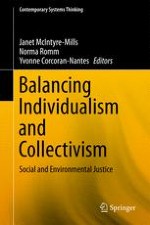2018 | OriginalPaper | Chapter
8. Gender, Climate Change, and Sustainable Development in Bangladesh
Authors : Yvonne Corcoran-Nantes, Snighda Roy
Published in: Balancing Individualism and Collectivism
Publisher: Springer International Publishing
Activate our intelligent search to find suitable subject content or patents.
Select sections of text to find matching patents with Artificial Intelligence. powered by
Select sections of text to find additional relevant content using AI-assisted search. powered by
